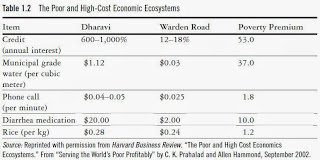I am reading this book called "The Fortune at the Bottom of the Pyramid" by C K Prahalad. This book discusses about inclusion of poor in strategy of larger private corporations. How they can be made consumers and creators of value and their untapped potential can be utilized for their own development as well as profits for private corporations. One very alarming data I found recently in this book is that the poor live in high-cost ecosystems. It means that they pay premium price for everything. They take credit at unbelievable rates.
Here is an example of Mumbai. It is taken from the same book. The result was earlier published in a research paper. The poor people live in an area called Dharavi. It is located in the center of the Mumbai city in India. Dharavi is like an area occupied illegally by poor people many years ago and that time, I guess Mumbai wouldn't even have been that big. But now it is the center of Mumbai as the city has expanded with growing population. There have been lots of studies done on Dharavi. It is a total slum area. While if you come out of this area, there is adjacent area called Warden Road which has higher income population and have better facilities. Now the below table shows the difference in the prices these two localities pay for different services.
It is shocking to see the rate of interest for people in Dharavi. It is 600-1000%. I guess this high rate is because though they can go to the banks in Warden Road area but may be since they live on illegally occupied land, they may not have bank accounts. And there are strong reliable intermediaries who charge such exorbitant rates. The book says that the difference is 5-25 times and it is generally same in all developing countries. There are local monopolies in such areas. The book says that banks can open their facilities for people in this area and can charge even up to 25% interest rate which is highly beneficial for the bank and extremely cheap for the poor people. It is also discussed that there is a lack of proper distribution of goods in such areas which can be done by the expertise of large corporate firms.
It is also to be noted that since the people in this area do not have legal title to land, they do not invest in real estate. Instead, they have basic equipment for daily life like television set, kitchen setup, and mobile phones.
This post is not very thorough researched. Feel free to add anything that you know about Dharavi or people at the bottom of the pyramid.
Read more...



